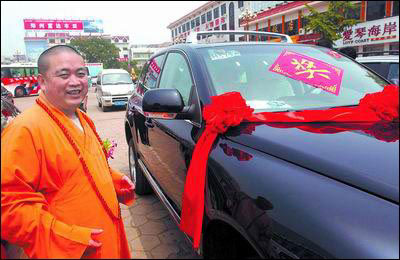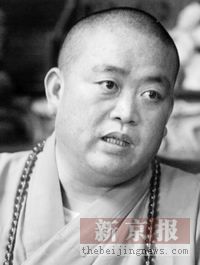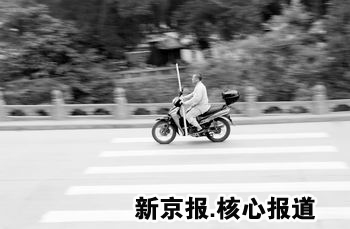[Learn
more about the Shaolin Kungfu]
Shi Yongxin, the abbot of Shaolin Temple, widely considered the birthplace of
Chinese Kung Fu, spends most of his day greeting corporate executives,
government officials and friends from all over the world and dealing with dinner
invitations and business instead of shepherding all disciples.

The abbot of the Shaolin temple in the central
province of Henan, Shi Yongxin, stands beside a spectacular sports sedan
worth 1 million Yuan (US$125, 000), which is awarded to him for his
contributions to the local tourism industry. [Dahe
Daily] |
When Henan officials presented Shi with a spectacular sports sedan valued at
one million yuan (US$125, 000) for his contributions to the local tourism
industry, it raised increasing doubts that Shi is a monk who is dedicated to
fortune rather than religion, the Beijing News Reported on August 30.
"I resorted to using commercialization to promote Shaolin culture," Shi says.
"I believe that people who concentrate on hard work can understand me."

Shi
Yongxin. [Beijing News] |
Displaying photos of top
Chinese leaders such as Jiang Zemin, Li Peng and Wu Yi along with Russian
President Vladimir Putin and former US Secretary of State Henry Kissinger,
Shaolin Temple is marked with Shi's commercialization efforts.
Shi was admitted to the temple in 1981 when it was in a total recession with
dozens of monks staying at the temple, where they lived on 28 mu (1.86 hectares)
of farmland. Nine of them were elderly.
He began to serve as abbot in 1987, five years after the internationally
acclaimed wuxia (literally meaning martial arts) movie 'Shaolin Temple',
starring Hong Kong star Jet Li, which put the temple in the international
spotlight.
Shi has been trying to strengthen cultural exchange and promote the
reputation of the temple since 1987, according to the paper.
"I aim to make Shaolin culture something people want to study," Shi says.
The abbot has set up research cooperatives with dozens of mainland
universities, including Tsinghua University and Peking University.
He has continued his cultural exchange with the international community.
Shi has purchased 12 square kilometers of land in Australia and is prepared
to build a Shaolin martial arts cultural center he says will be built according
to traditional Chinese construction methods.

A monk of the Shaolin Temple holding a
club rides a moto bike on a road August 24, 2006. [Beijing
News] |
"It may serve as a construction museum or an educational base," Shi says.
Shi's moves have sparked criticism nationwide from media reports to Internet
online posts.
"They have forgotten what their purpose is and are concentrating on what they
shouldn't do," Xinhua quoted an online post as saying.
Shi has moved to build a Shaolin medicine office in the southwest area of the
temple, and he is stepping up efforts to set up a Shaolin museum, according to
the paper.
"Before I can do anything the temple needs to acquire more land," Shi says.
"The expanded Shaolin temple is in need of land and I'm considering building
a museum, a practice hall, a Buddhist palace a science exchange
center."